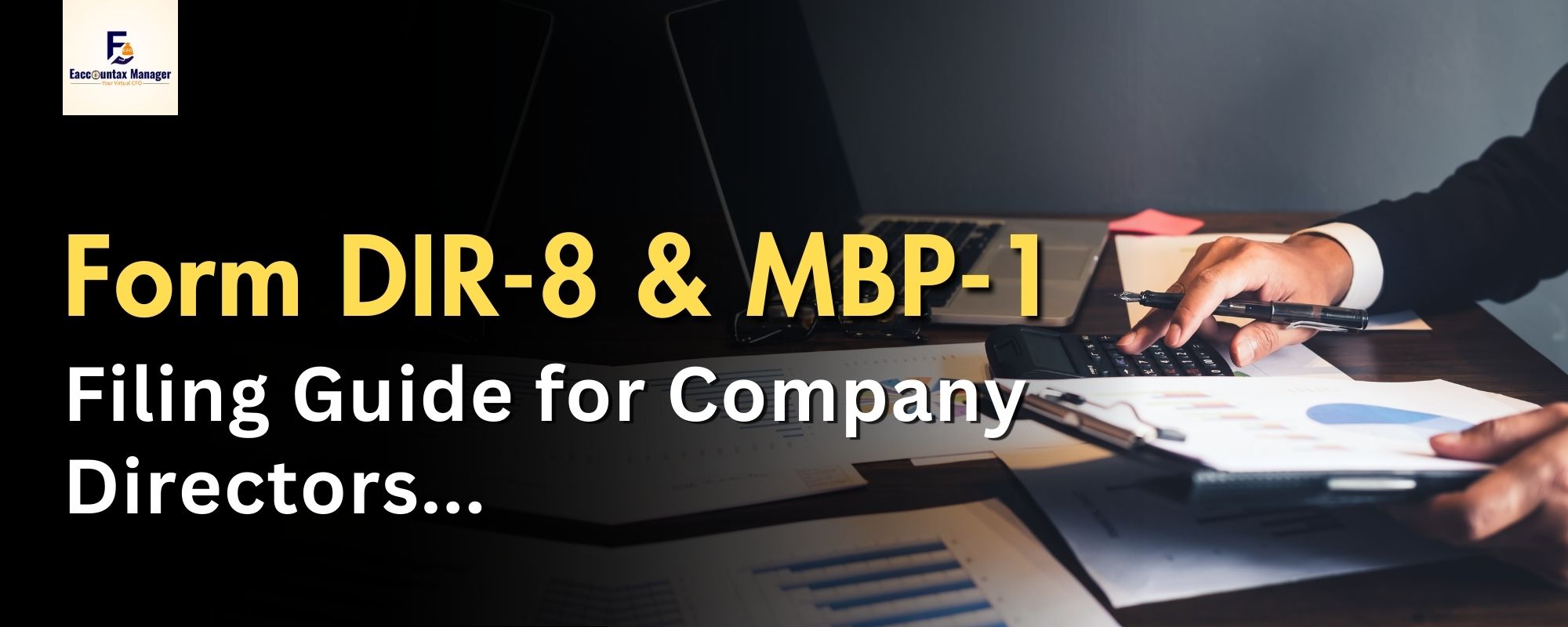Board Meeting Compliance Checklist for Companies under Companies Act 2013 Share A board meeting is a gathering of a company’s directors where …

In India, corporate governance requires directors of Private Limited Companies, Public Limited Companies, and other corporate entities to meet mandatory disclosure obligations under the Companies Act, 2013. Every director — whether existing, newly appointed, proposed, foreign, or additional — must submit Form DIR-8 (disclosure of disqualifications) and Form MBP-1 (disclosure of interest) to the company to ensure ethical governance practices.
After a company is registered with the Ministry of Corporate Affairs (MCA), it must hold its first board meeting within 30 days of incorporation, as per Section 173(1) of the Companies Act, 2013. At this meeting, directors must complete essential compliance steps, including filing DIR-8 and MBP-1.
Board Meeting Compliance Checklist for Companies under Companies Act 2013 Share A board meeting is a gathering of a company’s directors where …
What is Beneficial Ownership? – MCA’s 2024 MGT-6 Update Share In July 2024, the Ministry of Corporate Affairs (MCA) introduced a new …
What is Form DPT-3: A Simple Guide for Companies? Share Running a company is exciting, but keeping up with government rules is …
Understanding CSR-2 Filing Under the Companies Act, 2013 Share In today’s time, businesses are not just meant to earn profits—they are also …
Director KYC Filing Due Date – DIR-3 KYC Share Filing the Director KYC Form (DIR-3 KYC) is a must for every DIN …
Appointment of Auditor under Companies Act, 2013 Share When you start or run a company, one important thing you must do is …
On 1st January 2025, Mr. Karan Patel, an experienced professional, was offered a directorship by XYZ Private Limited. Before confirming his appointment, Karan needed to submit Form DIR-8, declaring he was not disqualified under Section 164(2) of the Companies Act, 2013.
After his appointment was finalized, Karan was invited to the company’s next board meeting scheduled for 30th January 2025. As per Section 184(1), before attending, he was required to file Form MBP-1, disclosing his interests in other entities. This step was crucial to maintain transparency and ensure compliance with the disclosure requirements under Sections 164 and Section 184 of the Companies Act, 2013.
As per Section 164 of the Companies Act, 2013, read with Rule 14 of the Companies (Appointment and Qualification of Directors) Rules, 2014, every director must submit Form DIR-8 every financial year. This declaration confirms that they are not disqualified from holding or continuing the position of a director. It is a crucial compliance step to ensure that only eligible and responsible individuals serve on the boards of Indian companies.
The primary purpose of Form DIR-8 is to affirm that the individual appointed or already acting as a director is free from disqualifications listed under Section 164. Some of the disqualification conditions include:
Section 164(1) of the Companies Act, 2013 disqualifies individuals from being appointed or continuing as directors if they:
Section 164(2) states that:
Every director must submit Form DIR-8 and disclose their interests in other entities at the following times:
As per Section 184 of the Companies Act, 2013, along with Rule 9 of the Companies (Meetings of Board and its Powers) Rules, 2014, every director is required to disclose their interests in other companies, firms, or entities by submitting Form MBP-1.
The objective is to maintain transparency by informing the Board about any potential conflicts of interest arising from a director’s associations elsewhere.
As we discussed before, Form MBP-1 is a declaration form where directors must reveal their personal and financial interests in other businesses. Here’s what needs to be included:
Although both forms are linked to a director’s responsibilities, they focus on different areas:
| Basis | Form DIR-8 | Form MBP-1 |
|---|---|---|
| Purpose | To confirm that a director is eligible and not disqualified. | To disclose any financial or other interests that could lead to a conflict. |
| Law Applicable | Section 164 of Companies Act, 2013 | Section 184 of Companies Act, 2013 |
| When Required | At appointment and every year thereafter. | At the first Board Meeting every year and whenever a new interest arises. |
| Type of Information | Declares qualification to act as director. | Discloses interests in other companies/firms/entities. |
| Record Keeping | Internal records of the company. | To be maintained at the registered office for 8 years. |
| Penalty for Non-Compliance | ₹1 lakh penalty if eligibility is not disclosed. | ₹1 lakh penalty for failure to disclose interests. |
Filing Form DIR-8 and MBP-1 is an essential part of private limited companies’ compliance under the Companies Act, 2013. It ensures transparency, prevents conflicts of interest, and strengthens corporate governance practices. Directors must fulfill these obligations sincerely to avoid penalties and maintain trust with stakeholders. Timely and accurate filings support the long-term success of any company in India.
At E Accountax Manager, we specialize in helping businesses stay compliant with the law. If you own a private limited company in Rajasthan, our expert team ensures that your filings like DIR-8 and MBP-1 are handled accurately and promptly. We offer personalized guidance and dedicated support, making us a reliable partner for your company’s compliance journey.
Learn more about the other compliances of Private Limited Companies…
*Wait after entering details; you’ll be redirected to book an appointment.

CA Jitendra Agarwal, a Chartered Accountant, is an experienced Income Tax Advisor with a proven track record in tax planning and compliance.
Form 10BD and 10BE Explained: Step-by-Step Filing Guide for NGOs Share To ensure transparency and accuracy in reporting donations, the Government of …
GST on Exports in India – A Complete Guide for Exporters Share The government of India implemented the Goods and Services Tax …
What is E-Invoicing System of GST? Share In recent years, the Government has undertaken several digital transformations in the Goods and Services …
GSTR-1/1A Filing Update May 2025: Mandatory Document Reporting of HSN Code in GSTR 1 Share The GST portal has introduced important changes …
Process of GST Registration in India Registering for GST in India is now very simple and fully online. The Ministry of Finance …
How to Register For EPF Online? Share If you want to give your employees the benefits of PF, you need to register …
Who is Eligible for ESI Registration in Rajasthan? Share If you run a business in Rajasthan, you might have heard about ESI …
What is a Public Limited Company? If you’re planning to start a big business or want to raise money from the public, …
What is A Private Limited Company? If you’re planning to start a business, you’ve probably heard the term “Private Limited Company.” But …
How to Get Money Lending License? Are you planning to start a money lending business in India? If yes, then getting a …
[metform form_id=”213″]
We value your privacy.